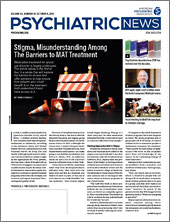APA has joined a friend-of-the-court brief, filed with the United States Court of Appeals District of Columbia Circuit, urging the court to strike down a proposed Medicaid waiver by the Commonwealth of Kentucky requiring Medicaid beneficiaries to work in order to receive benefits.
The amicus brief, filed with 10 other organizations, repeats all of the substantive points raised in an earlier brief filed with the United States District Court for the District of Columbia. In March that court struck down the proposed rules in Kentucky and Arkansas requiring Medicaid beneficiaries to work, stating that the federal government’s approval of those rules was “arbitrary and capricious.”
After a second round of public comment, the Department of Health and Human Services (HHS) re-approved a nearly identical approach by the Commonwealth of Kentucky. As before, the program’s proponents claim work requirements will lift beneficiaries out of unemployment, improve health outcomes, and strengthen social safety nets.
In the new amicus brief, APA and the other organizations make three overarching arguments. They are as follows:
•
Conditioning eligibility for coverage on employment will lead to mass disenrollment and dramatically worse health outcomes. By the commonwealth’s own estimates, this program will lead to 1.14 million lost coverage months—the equivalent of nearly 100,000 people losing coverage for a year. “HHS and Kentucky do not explain how often-insurmountable barriers to entering the workforce and remaining employed will go away just because the Commonwealth conditions health coverage on employment,” according to the brief. “Many unemployed and underemployed beneficiaries will simply lose coverage.”
•
Kentucky HEALTH (the name of Kentucky’s waiver program) imposes new burdens and penalties on beneficiaries that jeopardize coverage for the gainfully employed. It requires beneficiaries to report their work status monthly. Any reporting mistake could trigger disenrollment. Kentucky’s program requires beneficiaries to shoulder premiums, report any change affecting eligibility, and submit documentation for annual eligibility redeterminations. Under Kentucky HEALTH, failure to check these boxes can lock beneficiaries out of coverage for up to six months. That would create a steady churn of people losing coverage, only to get it back months later, possibly after they become sick.
•
Losing benefits exposes former beneficiaries to the risk of medical bills they cannot afford and, in some cases, the threat of bankruptcy. Without a reliably insured patient population, rural providers could be forced to shut down. The program will create new administrative expenses and increase Medicaid costs when healthy beneficiaries lose their coverage only to re-enroll when their health worsens and their conditions are costlier to treat.
In comments to Psychiatric News preceding the earlier district court case, Marvin Swartz, M.D., chair of APA’s Committee on Judicial Action, said that many individuals eligible for Medicaid may be unable to work even if the Social Security Administration has not officially determined them to be disabled.
“There are clearly documented gains in health outcomes resulting from Medicaid insurance coverage that will be lost, and predictably health will decline,” he said. “Such a work requirement is a considerable challenge for nondisabled individuals who have intellectual or mental health conditions that seriously interfere with the ability to work. They will very likely lose access to general and behavioral health care.” ■
The amicus brief is posted
here.

